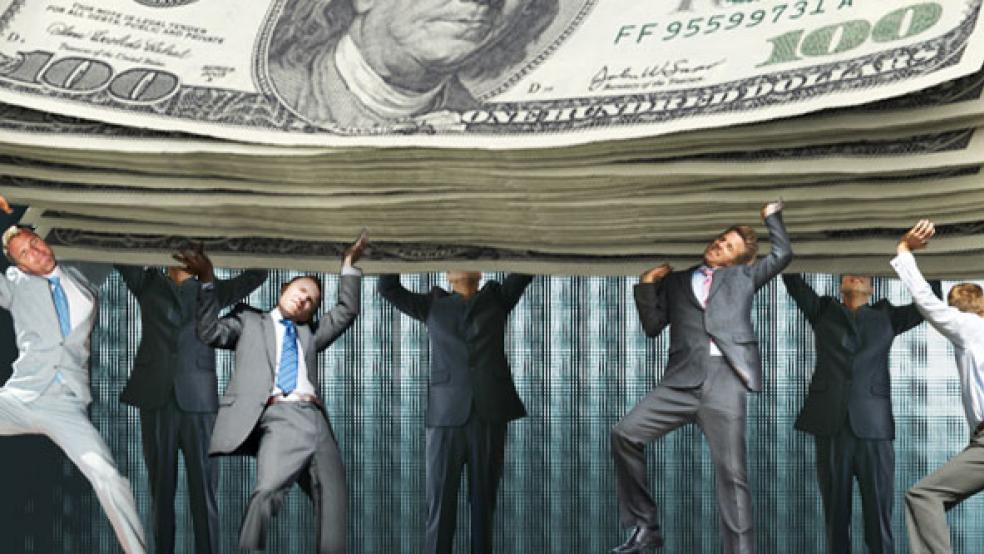While the recovering economy gives consumers plenty of reasons to cheer—better job security, rising home values—there’s one reason not to cheer: rising interest rates.
The Federal Reserve announced last month its plans to begin tapering its bond-buying program, a program that kept the lid on long-term interest rates in an effort to stimulate what has been a relatively weak economic recovery.
Related: 10 Personal Finance Predictions for 2014
Experts expect that move to continue pushing mortgage rates up in 2014, although outgoing Fed chair Ben Bernanke committed to keeping low the short-term rates that have created a dismal environment for savers looking for yield.
“It’s really the worst of all worlds for consumers,” says Richard Barrington, or MoneyRates.com. “There’s always a spread between mortgage rates and deposit rates, but it’s wide now and will get wider this year.” It’s been particularly tough on retirees who rely heavily on fixed-income investments like bonds and CDs.
Still, there are smart ways to make the most of today’s rate environment. Depending on your situation, here’s what you need to know about interest rates as 2014 gets underway:
Homebuyers: Last year, interest rates snapped a seven-year downward streak, rising nearly a full percentage point over a few months during the summer. Today’s 30-year fixed rate mortgages are running about 4.6 percent, and they’re expected to pass the 5-percent threshold by the end of this year, according to the Mortgage Bankers Association. That may not seem like a huge jump, but every extra point on a mortgage decreases buying power by about 10 percent.
Related: 7 Reasons the Fed Should Raise Interest Rates
It’s never a good idea to rush into buying a home, but if you’re thinking about doing so in the near future, it’s going to be cheaper sooner rather than later. Once you get close to closing a deal, consider locking in your mortgage rate. “I wouldn’t pay for the extended rate lock, but once you’re in the window and you have a closing date, don’t gamble,” says Greg McBride, a senior financial analyst with Bankrate.com.
Homeowners: If you haven’t taken advantage of historically low rates to refinance (or you’ve previously been underwater and were unable to do so), get the process started. Same goes for anyone with a fixed-rate mortgage who plans to stay in his or her home for more than a few years; lock in today’s low rates to avoid getting slammed by higher ones down the road. You may have missed out on the sub-4 percent loan, but today’s rates are still a bargain, relatively speaking. (Thirty-year fixed mortgage rates historically average more than 8 percent.)
If you already have a low rate, but need to tap into your home equity, consider a home equity loan or a home equity line of credit. These shorter-term loans are offering more favorable rates, and as home values rise, banks are becoming increasingly competitive in their offerings.
Car Buyers: Auto loans are the one bright spot when it comes to interest rates in 2014. They were at historic lows throughout 2013, and rates—which are averaging less than 3 percent—aren’t expected to budge much this year. Get a quote from your bank before you go car shopping, and then ask the dealer if he can beat it.
Credit Card Users: Issuers are getting extremely competitive for consumers with the best credit, offering fee-free cards with stellar reward programs, and generous balance-transfer offers. About a third of the cards tracked by CreditCards.com offer 0 percent interest—or extremely low interest—on purchases for nine months or more, up from 28 percent a year ago.
Related: 6 Ways Low Interest Rates Hurt Retirees
On the other hand, consumers with weaker credit may see their rates go up. Those in this category should focus on paying down their debt, boosting their credit score to get access to the more attractive cards and programs.
Bond Investors: Bond prices tend to fall when rates rise, which can be bad news for anyone with a portfolio heavily invested in them. “Bonds are going to be tricky in 2014 and on after that,” says Casey Bond, managing editor of GoBankingRates.com. “They’re not going to be the safe haven that people look for them to be.”
If you own individual bonds and plan to hold them to maturity, then it doesn’t matter what rates do. Avoid Treasuries, which are directly impacted by the Fed’s taper. When it comes to bond funds, look for those with a shorter-term duration, since long-term bonds are less sensitive to interest rate movement, although they offer a lower yield.
Savers: As anyone with a savings account knows, rates are appalling low right now (the average savings account rate is just 0.11 percent). “It’s a more favorable environment to borrow than to save right now,” says Alan MacEachin, an economist with Navy Federal Credit Union. “That’s exactly what the Fed wants. They want people out spending rather than saving.”
Online banks and credit unions are offering slightly higher rates, so it’s worth shopping around to see if you can find an account offering closer to 1 percent in interest. With such low rates, it becomes even more important to make sure you’re using a bank with minimal fees; otherwise you’ll completely wipe out any paltry interest payments you do receive.
Another option for savers is to look into either very short-term CDS or longer-term CDs that have a very low early-withdrawal penalty. Some longer-term CDs charge a few months interest to access your cash before the CD has matured, making it easier to cash out and get a better deal if rates start ticking up.
Top Reads from The Fiscal Times:



